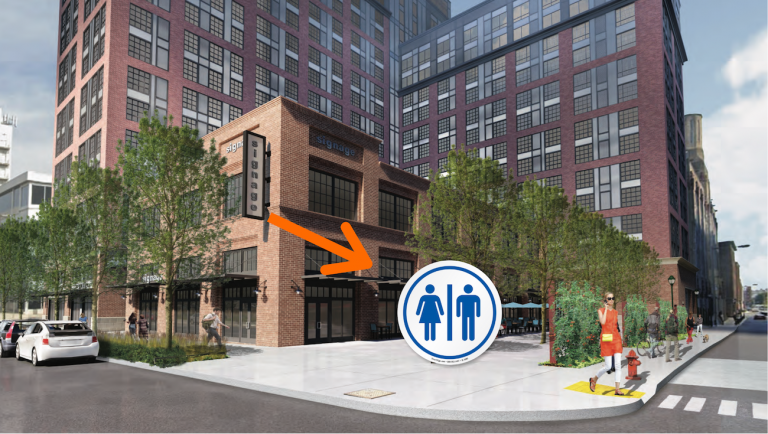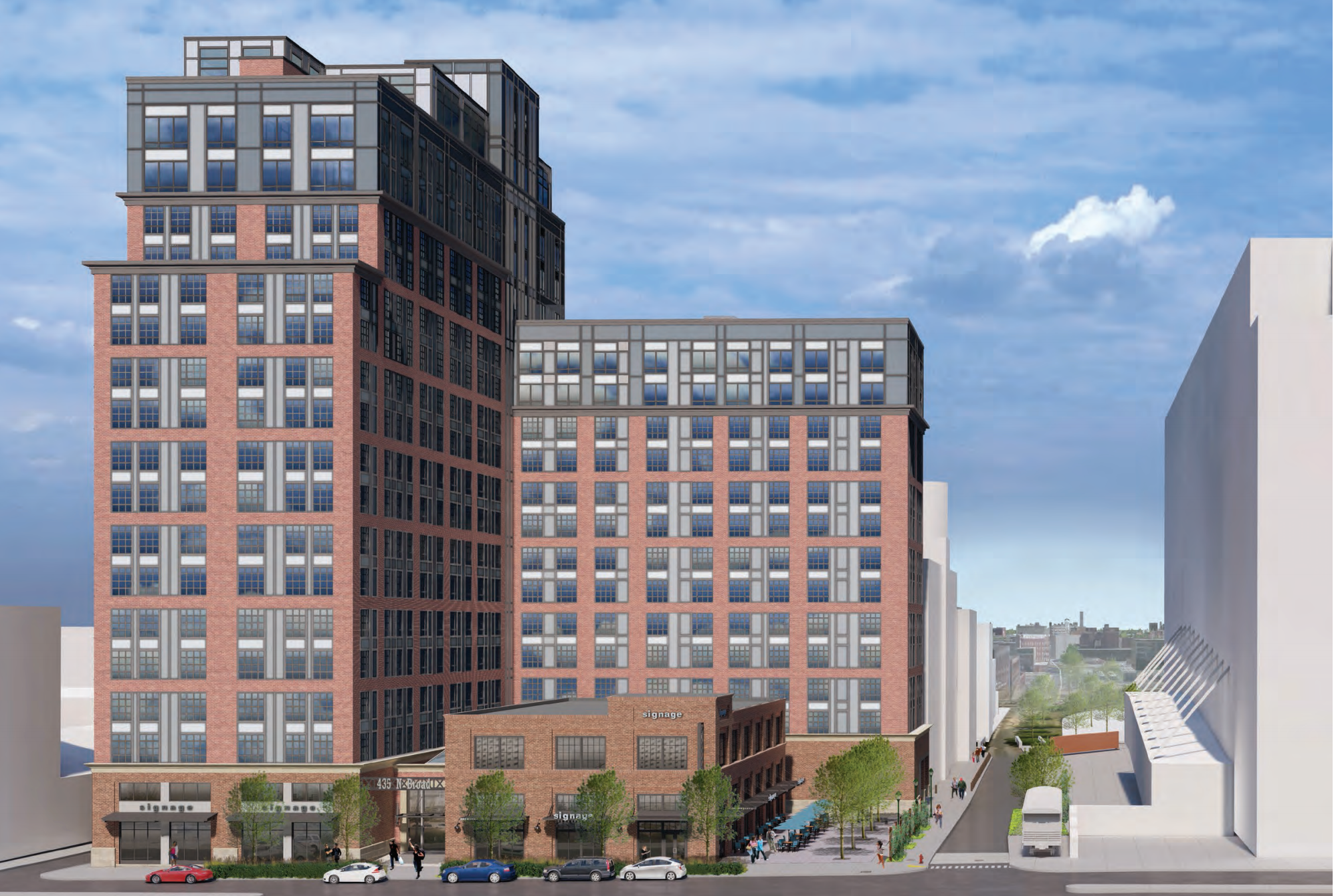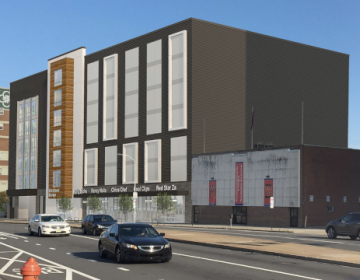Will Toll Brothers build Philadelphia’s first corporate-owned public bathroom?
Callowhill neighbors want a developer to address a persistent neighborhood problem: no place to pee.

A rendering of a complex planned for North Broad, near the Rail Park. Neighbors want the developer to put a public bathroom in the project's public plaza. (Courtesy of Toll Brothers/Barton Partners Architects/PlanPhilly)
North Broad is booming, from City Hall to Germantown Avenue. There are all-day cafes, apartment complexes, parks, and the recently reopened Met. One missing piece: a place to pee.
While some restaurants have public bathrooms, there are few easily-accessible restrooms in the formerly industrial area. Not even the city’s new Rail Park offers a public loo.
A group of nearby residents, organized by the Callowhill Neighborhood Association, want to change that.
“We suggest that we have public restrooms,” said Sarah McEarney, president of the Callowhill Neighborhood Association
McEarney made her request Tuesday, at a meeting of the city’s Civic Design Review, or CDR, in response to a plan for a new development at 427-43 North Broad. The longtime activist wants the project’s developer, Toll Brothers, to include toilets in the project’s public plaza.
Just a half-block from the Rail Park, the Toll Brothers project would convert an overgrown surface parking lot into an 18-story tower complex with retail, office space and a tree-lined public space designed by Studio Bryan Hanes, which also designed the nearby elevated green.
The 5,000-square-foot plaza will play a key role in connecting the private complex to the surrounding neighborhood, with a design that will “energize Noble Street and signify/identify a gateway to the Rail Park,” Toll Brothers’ architect, Barton Partners, said in a proposal submitted to CDR.
Toll’s 368-unit project is one of three developments planned for the intersection of North Broad and Spring Garden reviewed Tuesday by the city board.

The projects, combined, would add more than 800 new living units to an area now dominated by parking lots. On a recent morning, the pavement in front of the Broad and Noble lot sat empty. The handful of commuters passing by, bundled in winter jackets and bracing themselves against the wind, barely stopped to look up. Soon, there will be much more to see.
“Within our coverage area, there are about 50 new or proposed developments taking place,” said Shalimar Thomas, executive director of North Broad Renaissance, the corridor’s community development corporation.
Cleanliness and safety stand among North Broad Renaissance’s top priorities for redevelopment, according to the organization’s five-year strategic plan released in 2016.
In the years since the plan came out, the group has implemented a cleaning service, begun an anti-litter campaign improved street lighting and more. A public bathroom hasn’t been on the agenda until now and the city has no current plans to install one at the Rail Park or anywhere on North Broad.
McEarney argued Tuesday that the plaza designated for public space by Toll could continue to improve the area — if it included a public toilet.
The case for public bathrooms
There’s growing public recognition of the need for public bathrooms in a city with a large population of homeless or housing-insecure people. Just a few months ago, the city installed its first public toilets in Kensington, where the city is struggling to contain a dangerous Hepatitis A outbreak.
Plus, who hasn’t found themselves in Center City in desperate search of a public facility?
But there are no known examples of a private developer in the U.S. building a public restroom unattached to a retailer. The reasons: liability and cost.
Public restrooms must be kept clean and safe; they require a higher level of maintenance and inspection than an open plaza. On the day the city installed its public toilets and sanitizing faciities in Kensington, one hand-washing station was tipped over into a trash can and dented, according to Billy Penn.
Thomas acknowledges the potential benefits of a public bathroom in the area. But she also recognizes the potential difficulty of maintaining one. “I go jogging on Kelly Drive, and the [public] bathroom there — it’s not always good. Everybody uses it, from our homeless population to joggers, and you have to maintain that, and that’s a lot,” she told PlanPhilly Thursday. “A public bathroom is just that, a public bathroom. You can’t decide who uses it … you have to think about that maintenance cost.”
Toll Brothers, which built its name on suburban McMansions before moving into the urban condo market, responded warily to the idea of moving into the bathroom business.
“On the issue of the public restroom, I think it’s a difficult one,” the developer’s attorney Peter Kelsen said Tuesday. Instead, Kelsen added, the developer is actively interested in attracting retail tenants that will provide and maintain restrooms open to the public.
But that’s not enough for community members.
“We urge Toll Brothers to provide a public restroom that is not dependent on potential retail tenants,” said McEarney.
In an emailed statement to PlanPhilly, Toll remained diplomatic about the possibility.
“We are committed to hearing and addressing neighborhood concerns,” spokesperson John Piedrahita wrote. “We are working with multiple community stakeholders to consider the suggestion of a public restroom in the area at this time.”
Kelly Cofrancisco, a spokesperson for Mayor Jim Kenney, said Thursday that the city has no plans to install public restrooms beyond the stations in Kensington.
The rapid development on North Broad is also igniting worries about walkability.
The Civic Design Review board had several suggestions, including leveling the plaza and taking down a series of vine-covered fences that separates the lot from the street. One speaker from the neighboring Mathematics, Civics & Sciences Charter School spoke about the dangers for students who walk to school, especially during peak traffic hours, and asked that the developers consider the impact of increased congestion on Hamilton Street.
To that end, the city is studying the feasibility of putting a new traffic signal at 12th and Noble. The study comes in response to a request from Callowhill neighbors.
But many of the questions boiled down to a conundrum now in discussion citywide: What should public spaces created by private developers look like?
That’s a particularly important question for 427-43 N. Broad since the lot’s location on Noble Street marks the transition between bustling Broad Street and Callowhill’s Rail Park, the elevated park that serves as Philly’s answer to Manhattan’s High Line. A well-designed public plaza could attract pedestrians on noisy North Broad towards the park; conversely, an uninviting one could keep pedestrians from entering or engaging in either space.
“My concern [is] making sure that public space will actually feel public, especially if the retail tenants are unknown or if the retail spaces remain vacant for several months or years,” said Vincent DiMaria, a board member of the Callowhill Neighborhood Association.
The promise of an inclusive public space underwrote taxpayer support of the $10 million first phase of the Rail Park, a city-owned space funded by a mix of public and private dollars and managed by nonprofit Friends of the Rail Park and the Center City District. In the first year since the reinvented rail viaduct opened it’s held more than 50 events open to the public, with over 1,000 attendees, in addition to its regular visitors.
Rob Thomas, an independent contractor and fabricator working on the Rail Park for the Center City district, says he’s seen the park become more popular over time. “There’s a lot of tourists who come through, a lot of people walking their dogs … it’s real pretty with the lights up at nighttime.”
It’s likely those people and their needs will come up in the next hearing on the Noble-Broad project, after a slim majority of the Civic Design Review board voted to continue rather than conclude the review process.
WHYY is your source for fact-based, in-depth journalism and information. As a nonprofit organization, we rely on financial support from readers like you. Please give today.







